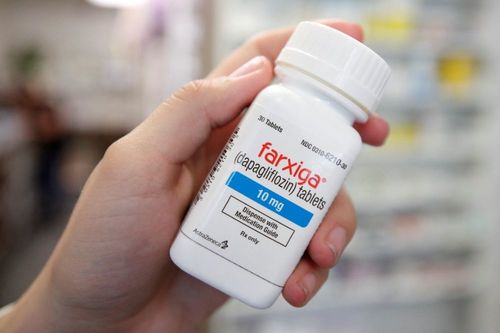Rapid Weight Loss With Farxiga: Complete Guide
Riya Lisa Ghosh
Updated At 26 Aug 23
The search for methods to achieve weight loss goals is never ending. Lately, the use of Farxiga has been gaining prominence.
This medication was formulated to manage type 2 diabetes. It has now emerged as a solution for weight loss as well. This article will delve deep into the world of Farxiga, uncovering its intricacies, mechanism of action, weight loss potential, advantages, disadvantages, potential side effects, post-treatment care, and the notable individuals who have embraced it in their weight loss journeys. While many diet plans like Atkins, Noom diet plans are popular, usage of Farxiga for weight loss has been gaining popularity as well.
Weight Loss With Farxiga - Detailed Guide

What is Farxiga?
Farxiga, or dapagliflozin in its generic form, is an oral medication that was initially developed to treat type 2 diabetes.
Classified as a sodium-glucose cotransporter-2 (SGLT2) inhibitor, this class of drugs works by preventing the kidneys from reabsorbing glucose, resulting in an increased excretion of glucose through urine.
How Does Farxiga Promote Weight Loss?
While its primary design focused on regulating blood sugar levels in individuals with diabetes, Farxiga has exhibited the potential to facilitate weight loss.
The mechanism of action is rooted in its ability to curtail glucose reabsorption, thereby creating a calorie deficit. As glucose intake declines, the body starts relying on stored fat for energy, gradually leading to weight loss.

The main way Farxiga is thought to cause weight loss is by removing glucose (sugar) from your bloodstream. This makes less glucose available to be turned into fat.
On average, Farxiga removes about 75 grams of glucose from the blood each day. That equates to a loss of 300 calories.
If you are interested in weight loss, do make sure to check out Dukan diet for weight loss as well.
Efficacy in Weight Loss
Farxiga's efficacy in fostering weight loss has attracted attention from the medical community. Rigorous clinical trials have showcased significant weight loss among non-diabetic individuals who were administered Farxiga, compared to those who received a placebo.
This weight loss phenomenon is attributed to the drug's capability to lower calorie absorption from glucose while encouraging fat utilization.
One study conducted on Farxiga showed that people with type 2 diabetes who took the medication lost an average of 5.7% of their body weight over a 52-week period. Another study found that Farxiga led to a reduction in body weight in people with obesity who did not have diabetes.
It’s possible that your body weight could start decreasing as soon as 3 days after starting Farxiga. However, the weight loss during the first month is usually from fluid loss (“water weight”). Fat loss happens more slowly — within 6 months of starting Farxiga.
Also check out Paleo diet for weight loss as this is very effective as well.

Pros and Cons
Pros:
Dual-Action Benefits: Farxiga offers the unique advantage of addressing both diabetes management and weight loss concurrently, saving time and effort for those with both concerns.
Non-Invasive Approach: Unlike invasive surgical weight loss procedures, Farxiga can be conveniently taken orally, eliminating the need for surgical intervention.
Sustainable Weight Loss: Farxiga's gradual weight loss approach encourages sustainable and healthier weight management practices, reducing the risk of rapid weight regain.
Read More: Mayo Clinic Diet Foods List
Cons:
Potential Side Effects: As with any medication, there are potential side effects associated with Farxiga, which will be explored further in the subsequent section.
Not an Instant Fix: The weight loss facilitated by Farxiga may not be as rapid as some other methods, necessitating consistent and prolonged usage.

Potential Side Effects
While Farxiga holds promise, it's imperative to be aware of potential side effects. Common side effects include heightened urination, increased thirst, and a susceptibility to yeast infections. Although rare, more severe side effects can encompass kidney complications and ketoacidosis. Consulting a healthcare professional before initiating Farxiga is critical to understanding the potential risks and benefits.
The most common side effects of Farxiga include:
Genital yeast infections: Farxiga may increase the risk of yeast infections, which can cause itching, redness, and discharge in men and women.
Increased urination: This happens because the drug increases sugar concentration in urine causing the body to respond by trying to dilute the urine. This can result in increased urination and should therefore be immediately counteracted by drinking more fluids.
Read More: Keto Diet
Post-Treatment Care
After commencing the Farxiga regimen, maintaining regular contact with your healthcare provider is essential. This includes diligent monitoring of blood sugar levels, kidney function, and overall health. Complementing the effects of Farxiga with a balanced diet, regular exercise, and a holistic healthy lifestyle can optimize weight loss outcomes.
Notable Individuals
While concrete information about celebrities or individuals who have utilized Farxiga for weight loss might not be widely accessible, it's important to recognize that the adoption of this medication for weight loss purposes is still relatively novel. Consulting healthcare professionals is crucial for determining whether Farxiga aligns with individual weight loss goals.
Read More: What Is Atkins Diet
Farxiga Duration Of Usage
The duration for which an individual may need to take Farxiga can vary significantly. Some individuals might employ it for a specific period to initiate weight loss, while others may incorporate it into their long-term diabetes management strategy. Healthcare providers will tailor the treatment duration based on individual health requirements and objectives.

Farxiga, originally designed to manage type 2 diabetes, has demonstrated potential as a weight loss aid due to its mechanism of action. While it boasts the dual benefit of addressing both diabetes and weight management, it's imperative to weigh the pros and cons, consider potential side effects, and seek guidance from healthcare professionals before integrating it into your weight loss journey. Remember, any approach to weight loss should embrace a comprehensive perspective on health, integrating dietary habits, physical activity, and medical supervision for sustainable success.
Frequently Asked Questions (FAQs)
1. What is Farxiga, and how does it work for weight loss?
Farxiga, also known as dapagliflozin, is a medication primarily developed to manage type 2 diabetes. It belongs to the class of drugs known as sodium-glucose cotransporter-2 (SGLT2) inhibitors. Its mechanism of action involves preventing the kidneys from reabsorbing glucose, which leads to increased glucose excretion through urine.
This reduction in glucose absorption creates a calorie deficit, promoting the utilization of stored fat for energy and contributing to weight loss.
2. Can Farxiga be used solely for weight loss, even if I don't have diabetes?
While Farxiga was originally designed for diabetes management, it has shown potential for weight loss in non-diabetic individuals as well.
Clinical trials have demonstrated significant weight loss in subjects without diabetes who took Farxiga.
However, it's crucial to consult a healthcare professional before considering Farxiga solely for weight loss, as they can provide personalized guidance based on your health status.
3. What are the potential side effects of Farxiga?
Common side effects of Farxiga can include increased urination, thirst, yeast infections, and urinary tract infections. More severe side effects are rare but may involve kidney problems and ketoacidosis.
It's important to discuss potential risks and benefits with your healthcare provider before starting Farxiga and to report any unusual symptoms promptly.
4. How long does it take to see weight loss results with Farxiga?
The rate of weight loss with Farxiga can vary from person to person. While some individuals may start experiencing gradual weight loss within a few weeks, it might take longer for others.
Consistency in taking the medication, along with a healthy diet and regular exercise, can contribute to more noticeable results over time.
5. Can Farxiga be taken alongside other weight loss methods or medications?
It's essential to consult your healthcare provider before combining Farxiga with other weight loss methods or medications.
They can evaluate potential interactions and provide guidance on the most appropriate approach for your individual health needs.
6. Are there any dietary or lifestyle considerations while taking Farxiga for weight loss?
Adopting a balanced diet and maintaining an active lifestyle are important components of any weight loss journey, including when using Farxiga.
Your healthcare provider can offer personalized advice on dietary choices, exercise routines, and other lifestyle adjustments that can complement the effects of the medication.

7. Can Farxiga lead to rapid weight loss?
Farxiga's weight loss effects are typically gradual rather than rapid. It promotes steady weight loss over time by creating a calorie deficit through decreased glucose absorption.
While the rate of weight loss may vary, the focus is on sustainable and healthier weight management.
8. Is Farxiga suitable for long-term use?
Farxiga's suitability for long-term use depends on individual health factors and goals.
Some individuals may use it for a limited period to kickstart weight loss, while others might incorporate it into their ongoing diabetes management plan.
Your healthcare provider will determine the appropriate duration based on your health needs.
9. Are there any age or gender restrictions for using Farxiga for weight loss?
Age and gender restrictions can vary based on local regulations and medical guidelines. Consult your healthcare provider to determine whether Farxiga is suitable for your specific age and gender group.
10. Can Farxiga interact with other medications I am taking?
Farxiga can potentially interact with other medications. Inform your healthcare provider about all the medications, supplements, and treatments you're currently using to ensure safe and effective use of Farxiga.
Please note that medical information and guidelines may change over time. Please consult a healthcare professional or your doctor before you finalize usage of Farxiga for weight loss.


























